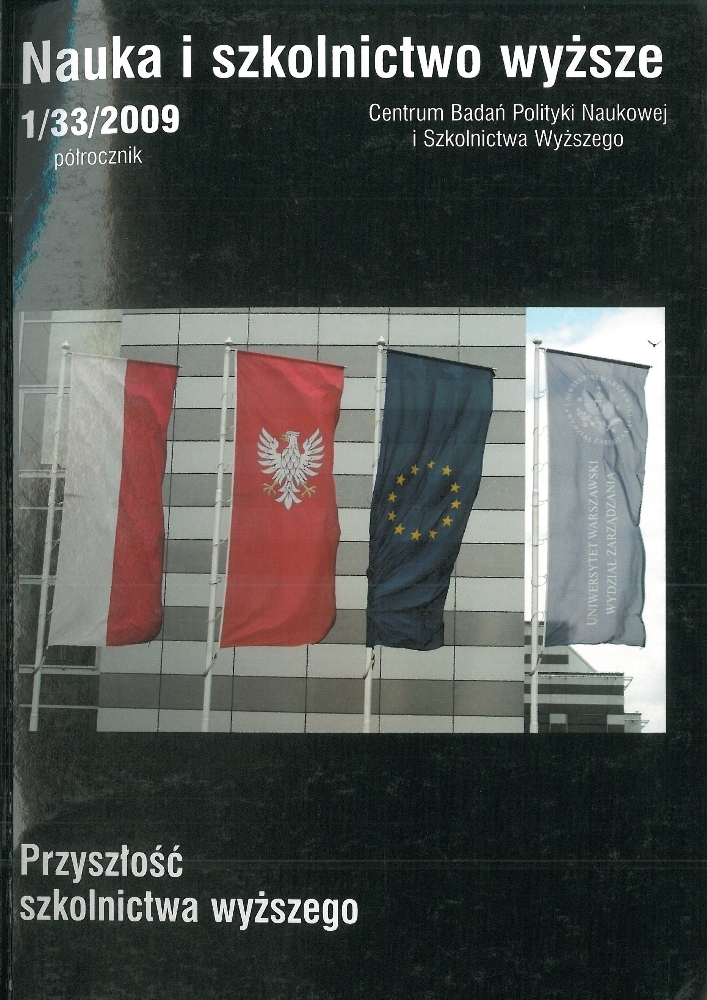Abstrakt
Autor podejmuje problem kosztów ponoszonych przez społeczeństwo na kształcenie, zwłaszcza wyższe, oraz efektów społecznych z kształcenia wyższego. Jego głównym celem jest oszacowanie wielkości kosztów ponoszonych przez polskie społeczeństwo w porównaniu z innymi krajami Unii Europejskiej i OECD oraz, na podstawie analizy literatury przedmiotu, określenie efektów społecznych wynikających z podnoszenia poziomu wykształcenia. Ten drugi cel miał pomóc w zweryfikowaniu tezy, że ponoszenie przez społeczeństwo nakładów na szkolnictwo wyższe jest uzasadnione.
Bibliografia
An C., Haveman R., Wolfe B. 1993 Teen Out-of-Wedlock Births and Welfare Recept: The Role of Childhood Events and Economic Circumstances, „Review of Economics and Statistics”, nr 2.
Barr N. 2001 The Welfare State as Piggy Bank - Information, Risk, Uncertainty, and the Role of the State, New York.
Bartel A.R, Lichtenberg F.R. 1987 The Comparative Advantage of Educated Workers in Implementing New Technology, „The Review of Economics and Statistics”, t. 69, nr 1.
Berger M.C., Leigh J.R 1989 Schooling, Self-Selection, and Health, „Journal of Humań Resources” nr 24(3).
Bundesministerium... 2007 Bundesministerium fur Bildung und Forschung: D/e Wirtschaftliche und soziale Lage der Studierenden in der Bundesrepublik Deutschland 2006, Bonn - Berlin.
Chapman B. 2005 Income Contingent Loans for Higher Education: International Reform, „Discussion Paper” nr 491, Centre for Economic Policy Research, London.
Denison E.F. 1962 The Sources of Economic Growth in the United States and the Alternatives Before, Committee for Economic Development, New York.
Ederer R, Kopf Ch., Schuller R, Ziegele F. 2000 Umverteilung i/on unten nach oben durch gebuehrenfreie Hochschulausbildung, „Arbeitspapier”
nr 26, Centrum fur Hochschulausbildung, Guetersloh.
Education... 2004,2007, 2008 Education at a Glance, OECD, Paris.
Eurostat, Bildungsfinanzindikatoren http://europa.eu.int/comm/eurostat/newcronos/reference/display.do?screen=welcomeref&open=/popul/edtr/educ/finance&language=de&product=EU_population_social_conditions&root=EU_population_social_conditions&scrollto=304
Glewie R 1999 lblhy Does Mother's Schooling Raise Child Health in Developing Countries? Evidence from Morocco, „The Journal of Humań Resources”, nr 1.
Gundlach E., Pablo J.N., Waisert N. 2001 Education Is Good for the Poor, „WIDER Discussion Paper”, nr 137.
Harbison E, Myers C A. 1964 Education, Manpower and Econommic Growth, McGraw-Hill, New York - Toronto - London.
Hitzan S., Paroush J. 1980 Imestment in Humań Capital and Social Self Protection under Uncertainty, „International Economic Review”, nr 3.
Jarecki W. 2005 Koszty kształcenia na studiach wyższych, „Polityka Społeczna”, nr 4.
Jarecki W. 2007 The Effectiveness of Education - Methodological Problems on the Basis of E.F. Denison’s Research, w: D. Kopycińska (red.): Competitiveness of Labour Market, Szczecin.
Johnstone D.B. 2004 The Economics and Politics of Cost Sharing in Higher Education: Comparative Perspectives, „Economics of Education Review” , nr 23.
Kirchner M. 2007 Geschenkter Wohlstand - Bildungsrenditen eines gebuehrenfreien Hochschulstudium, Universitat Potsdam, Potsdam.
Klimczak B. 2003 Rola edukacji w przygotowaniu mobilnych i aktywnych uczestników rynku pracy, w: A. Noga (red.): Jak tworzyć w Polsce nowe miejsca pracy, Polskie Towarzystwo Ekonomiczne, Warszawa.
Mankiw N., Romer D., Weil D. 1992 A Contribution to the Empirics of Economic Growth, „Ouarterly Journal of Economics” , nr 107 (2).
Pechar H., Keber Ch. 1996 Abschied vom Nulltarif - Argumente fur sozialvertragliche Studiengebuhren, Universitat Wiena, Wien.
Pritchett L. 2001 Where Has Ali the Education Gone?, „The World Bank Economic Review”, 1.15, nr 3.
Psacharopoulos G. 1995 The Profitability of Imestment in Education, „University Oldenburg Paper Reviews”.
Rocznik... 2002 Rocznik statystyczny 2002, Główny Urząd Statystyczny, Warszawa
Rogers M L. 2008 Directly Unproductive Schooling: How Country Characteristics Affect the Impact of Schooling on Growth, „European Economic Review”, nr 52.
Saxton J. 2000 Imestment in Education: Pmate and Public Returns, Joint Economic Committee United States Congress, Washington D.C.
Schultz T.W. 1961 Investment in Human Capital, „The American Economic Review”, nr 51 (1).
Schultz T.W. 1971 Investment in Human Capital. The Role ot Education and of Research, The Free Press, New York - London.
Schumann Ch. 2001 Zum Aufbau von Humań kapitał: Imestitionen in hóhere Bildung in Estland, Potsdam.
Solow R.M. 1956 A Contribution to the Theory of Economic Growth, „Quarterly Journal of Economics” nr 70 (1).
Soszyńska E. 2008 Jakość instytucji, kapitał ludzki a dynamika rozwoju gospodarczego, referat wygłoszony na V Zjeździe Katedr Ekonomii, Międzyzdroje 2008.
Szkoły wyższe... 2008 Szkoły wyższe i ich finanse w 2007 r., Główny Urząd Statystyczny, Warszawa.
Stoker E., Streckeisen U., Wolter S.C. 1998 Indikatoren zum Humankapital, Bundesamt uer Statistik, Neuchatel.
Venniker R. 2001 Social Returns to Education: A Survey of Recent Literaturę on Humań Capital Externalities, „CPB Report”, nr 1.
Wolter S.C. 2001 Bildungsfinanzierung zwischen Markt und Staat, Zurich.
Wolter S.C., Weber B. 2005 Bildungsrendite-ein zentraler ókonomischer Indikator des Bildungswesens, „Das Magazin fur Wirtschaftspolitik”, nr 10.
